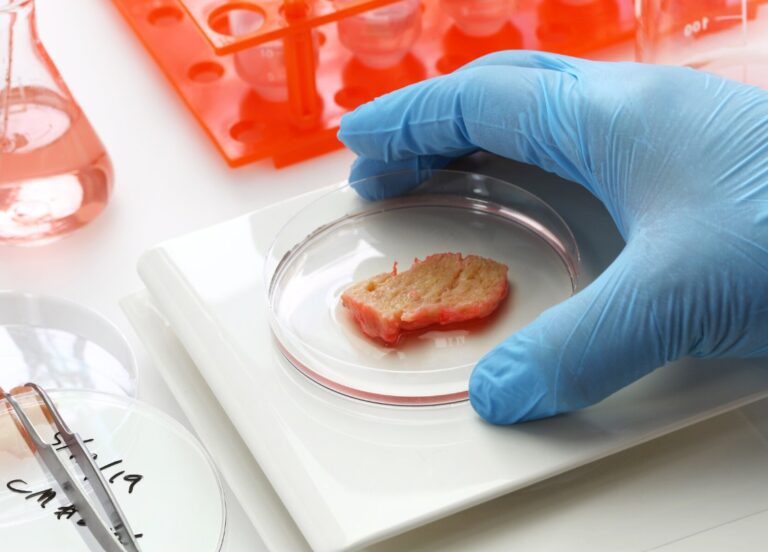Cultivated meat represents a groundbreaking shift in food technology, emerging as a vital tool in our fight against climate change. It’s not just another food trend; it’s a revolution in how we produce protein sustainably. At its core, cultivated meat is grown from animal cells, bypassing traditional livestock farming. This innovation promises significant environmental benefits, tackling issues like greenhouse gas emissions and land use.
Globally, over 100 startups are racing to refine this technology. In 2022 alone, the sector witnessed unprecedented milestones: record-breaking funding rounds and innovative product developments. As debates continue over its scalability and feasibility, one element stands out as pivotal: government support. Policies, subsidies, and regulatory frameworks are essential gears in turning this vision into reality.
Several governments are leading the charge, making notable strides in regulation and financial backing. These efforts are critical for bringing sustainable protein from the lab to the dinner table. The United States and Singapore, among others, have made significant regulatory updates, setting the stage for this new era of food technology.
Table of Contents
The 7 countries supporting cultivated meat
These are the countries supporting lab-grown meat:
1. Singapore
In December 2020, Singapore made headlines as the first country to approve the sale of cultivated meat. The Singapore Food Agency (SFA) granted Eat Just’s chicken nuggets pre-market approval, a groundbreaking step. Since then, Singapore has expanded its portfolio, approving additional products like chicken breast and processing licenses for companies like Esco. Anticipation is high for the approval of Vow’s cultivated quail.
Singapore’s approach involves a dynamic regulatory framework, revised multiple times to incorporate industry feedback. This adaptability is part of Singapore’s broader goal to produce 30% of its food locally by 2030. The government’s investment in the sector has attracted both local startups, like Shiok Meats, and international ones, like Eat Just and Avant, using Singapore as their Asian hub. Singapore’s pioneering role sets a global benchmark for cultivated meat adoption.
2. Israel
Israel stands out as a global leader in cultivated meat. The Israeli Innovation Authority’s recent $18M investment in a national consortium underscores this leadership. This consortium unites 14 companies and 10 academic and research institutions. Beyond research, Israel has funneled over $13M into early-stage startups and infrastructure within the alternative protein sector.
This commitment positions Israel at the forefront of the cultivated meat revolution, blending government support with innovative research and industry collaboration.
3. The United States
The United States is on the cusp of approving the sale and consumption of cultivated meat, with expectations set for late 2023. California’s Upside Foods recently achieved a milestone, obtaining FDA GRAS status for its cultivated chicken. Similarly, Eat Just received a “no questions” letter from the FDA, moving closer to market readiness.
The U.S. regulatory framework involves both the FDA and USDA, ensuring safety and proper labeling. Financially, the sector has seen significant government backing. Notably, a $10M grant from the USDA to Tufts University established the first-ever government-funded research project in cellular agriculture.
The Biden administration’s commitment to alternative proteins was further reinforced with funding for cultured animal cell-based foods and a global food security strategy aimed at ending hunger and enhancing food resilience.
Read also: U.S., definitive green light for sale of lab-grown meat
4. The European Union
In the European Union, cultivated meat products are subject to rigorous testing by the European Food Safety Authority (EFSA), similar to other novel foods. Products potentially using genetically modified ingredients must also align with the EU’s GM foods regulations. Despite these stringent safety rules, which might slow market entry, the EU is investing in cultivated meat as part of its climate agenda.
The 2020 Farm to Fork strategy and 2021 Strategic Foresight Report emphasize alternative proteins for a sustainable food system. Furthermore, the Horizon Europe program dedicates about €7M specifically to cultivated meat and seafood, aiming to enhance cost-efficiency, infrastructure, and scalability.
5. European powerhouses: The Netherlands and Norway
The Netherlands and Norway are European front-runners in cultivated meat support. The Netherlands has invested €60M in the Cellular Agriculture Netherlands consortium, demonstrating significant commitment. Meanwhile, Norway has established a five-year research project in cellular agriculture, backed by €2M in annual public funding. These investments highlight the countries’ focus on advancing the alternative protein sector.
6. Australia and 7. New Zealand
Australia and New Zealand are prepared to integrate cultivated meat products under their existing Novel Foods Standards. These regulations are set to handle cell-agriculture-based foods, including those using genetic modification technologies. Companies aiming to enter these markets must seek pre-market approval from the Food Standards Australia New Zealand (FSANZ). The adaptability of current standards and labeling requirements to newly cultivated meat products was affirmed at the Food Ministers Meeting in November 2022, indicating readiness to embrace this emerging food technology.
Government support for cultivated meat is rising
Countries around the globe are recognizing the potential of this innovative food technology in addressing environmental and sustainability challenges.
From Singapore’s trailblazing approvals to the strategic investments of the European Union, the Netherlands, Norway, Australia, and New Zealand, governments are playing a crucial role. Their efforts in funding, policy-making, and regulatory frameworks are paving the way for cultivated meat to transition from scientific theories to a commonplace item on our plates.
Read also: Lab-grown meat: all you need to know about its pros and cons












